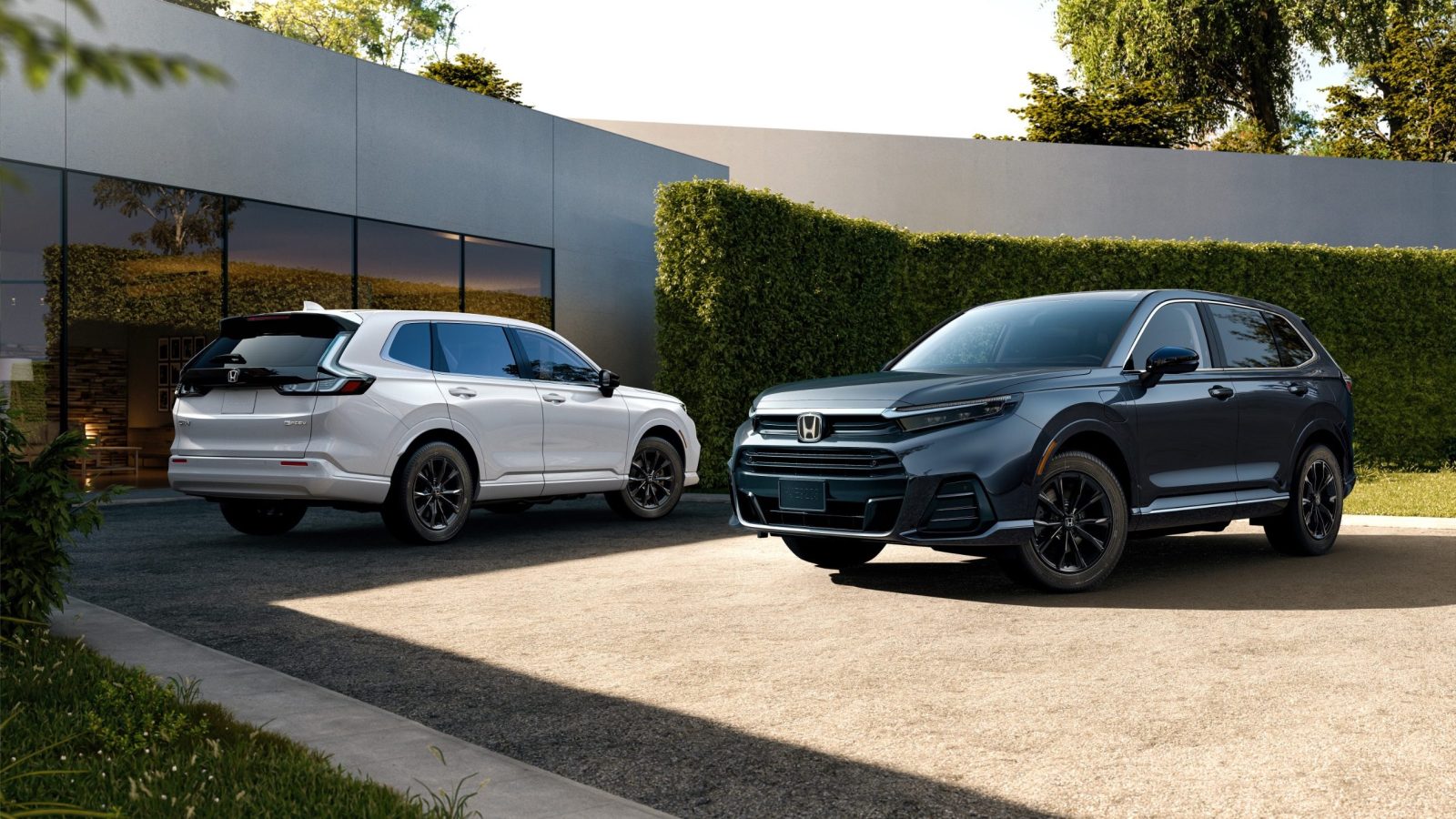
Honda has announced lease pricing for its upcoming CR-V e:FCEV fuel cell plug in hybrid, which operates either on electricity or hydrogen.
Honda first announced the CR-V e:FCEV earlier this year, and we got a chance to drive it at Honda’s California R&D center.
It’s an interesting idea that nobody’s done before. To help make up for the lack of hydrogen stations, you can fill the car’s 17.7kWh battery up with electricity at home for up to 29 miles of range of day to day use, and then fill up the 241-mile hydrogen tank, which is quicker to fill and has higher energy density than batteries, from time to time for longer trips.
When we drove it (and you can read our far too-detailed thoughts on it here), we got a lot of the technical stuff out of the way, but Honda hadn’t yet announced the specifics of its offering – just that it would be lease-only and would come with some amount of free hydrogen. Today, we’re finally getting the details.
Honda CR-V e:FCEV will lease for $389-$489/mo
Honda is offering three different lease deals on the CR-V e:FCEV, with two of them at a relatively standard 12k miles per year, and one high-mileage lease with a 2 year, 60,000 mile term.
| 2025 Honda CR-V e:FCEV Touring Lease Options | |||
| Monthly payment | $459 | $389 | $489 |
| Due at signing | $2,959 | $2,889 | $2,989 |
| Lease term | 3 years | 6 years | 2 years |
| Allowable mileage | 36,000 | 72,000 | 60,000 |
| Hydrogen fuel credit | $15,000 | $30,000 | $25,000 |
The monthly pricing is a little high compared to the great EV lease deals we’ve been seeing lately (e.g. Model 3 for less than a Camry, Hyundais for around $200/mo, or the Toyota bZ4X for next to nothing), but still fairly reasonable. And it comes with a free hydrogen fuel credit, which will help to make up for some of that difference in lease cost (and good thing, since hydrogen is currently ~$32/kg which means it’s $130+ to fill up its 4.3kg tank).
The lease also includes 21 days of free Avis rentals, but only in California – which is incidentally the only state that Honda will lease the car in.
The CR-V e:FCEV will be available starting July 9. Honda plans to offer about 300 vehicles for lease.
Electrek’s Take
While I do think it’s interesting what Honda is doing with the CR-V e:FCEV, it’s sort of a solution in search of a problem. But it’s also not much of a solution, since Honda plans to offer 300 of these vehicles in a state which has 30 million vehicles.
Honda says that working on fuel cell technology will help them hedge their bets, instead of focusing fully on BEV as most of the industry is doing. Honda is right that fuel cells could have a niche – but that niche is probably in heavy transport, not in light-duty consumer vehicles. Honda did recently show a Class 8 hydrogen truck concept, but it’s looking for partners to bring it to reality as it doesn’t currently make semi trucks itself.
And giving out free energy is fun, but it eliminates the whole point of the hybrid. Drivers can either pay for their own electricity, which is more efficient and ought to be cheaper than either gas or hydrogen, or they can go to the hydrogen station for free fuel.
Top comment by CMG30
With every battery advance, the case for hydrogen just gets more absurd. Already batteries have been offering more range than hydrogen and the arrival of cells like the condensed battery blows out any range argument that the hydrogen people have. (You simply cannot fit enough bulbous tanks into a vehicle to match range a smartly packed skateboard of cells would give you). With the advent of 4C charging, refuelling times of 10 minutes are here. Ask anyone who's been frozen to a hydrogen pump and they'll gladly take 10 minutes.
Worse, why would you opt for a fuel cell when you could just buy the exact same vehicle that burns gas? You're not saving the environment. The 'affordable' hydrogen is made by cracking methane and exhausting the CO2 into the atmosphere.
Remember folks, hydrogen is currently a climate PROBLEM. Until it cleans up it's act, it should not be considered for anything.
This removes the EV convenience filling up at home, and just makes the vehicle a comparatively inconvenient hydrogen car, which will mostly end up being fueled at one of very few California hydrogen stations instead of in the comfort of the parking spot it returns to every single night. Because why would you fill up at home when hydrogen is free?
Conversely, with a BEV, you could have that convenience, and have more availability of DC chargers on the road, including out-of-state, with little additional charging time (assuming you use one of the fastest charging EVs) – and the EV is more efficient than the hydrogen car to boot.
Which brings up the actual solution to the problem that Honda is trying to solve here: why not just get a battery-electric car instead?
Read More – First drive: Honda says its CR-V e:FCEV plug-in fuel cell hybrid is the future. Is it?
FTC: We use income earning auto affiliate links. More.





Comments